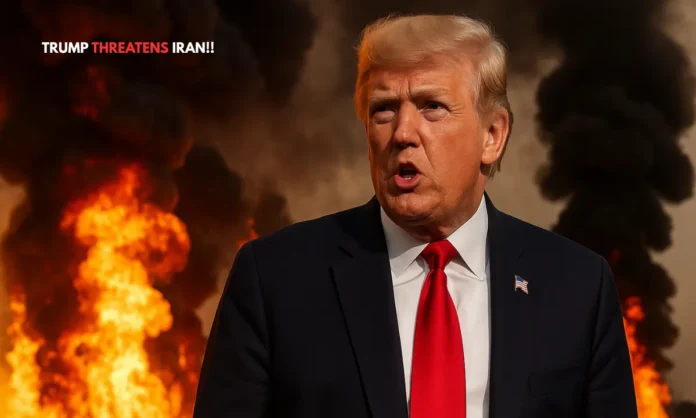SUMMARY
- Donald Trump warns of repeat airstrikes on Iran if uranium enrichment continues.
- US Supreme Court allows parts of Trump’s birthright citizenship order to take effect.
- Iran suspends cooperation with IAEA, accuses Grossi of enabling US-Israel attacks.
A New Nuclear Red Line in a Constitutional Crossfire
As the fires from the Iran-Israel conflict still smoulder, Donald Trump has thrown gasoline on global tensions—again. In his latest salvo, the former and potentially future President of the United States declared he would order fresh bombings of Iran “without question” if the country resumed its uranium enrichment. The remarks, delivered with characteristic bravado, come at a time when geopolitical nerves are already frayed and diplomacy is hanging by a thread.
This isn’t just Trump the showman talking. It’s a layered display of what Trump 2.0 could look like: a presidency combining military aggression abroad with constitutional reshaping at home. Within hours of the Iran remarks, the Trump administration celebrated a temporary but significant legal victory—a greenlight from the US Supreme Court allowing parts of his executive order on restricting birthright citizenship to go into effect.
Amid all this, Iran has officially cut off cooperation with the International Atomic Energy Agency (IAEA), citing its chief Rafael Grossi’s recent report as a justification for Israel’s strikes. The region is once again on the verge of collapse, and Trump’s latest rhetoric has made one thing clear: he’s not just preparing for war—he’s building the legal and ideological framework for it.
TRUMP: I'd Bomb Iran Again "Without Question" If Intel Concludes They've Continued Nuclear Program pic.twitter.com/FdMfgN2wzj
— RealClearPolitics (@RCPolitics) June 27, 2025
Iran’s Red Line: Uranium, Bombs, and the Fallout of Global Posturing
- Trump threatens renewed bombing campaign if Iran enriches uranium.
- Iran cuts ties with IAEA, blames Grossi for enabling Israeli and US attacks.
- Pakistan and other allies condemn US involvement amid nuclear tension.
Former President Trump’s statement—delivered with trademark provocation—was that the United States “would bomb Iran again without a second thought” if the Islamic Republic continues uranium enrichment. These comments come after US airstrikes targeted Iranian nuclear facilities earlier this month in what was described as a preemptive measure to halt nuclear escalation.
This threat reawakens the nightmare of pre-emptive warfare in the Middle East. Trump’s doctrine—simple and severe—relies on overwhelming force and strategic ambiguity, a philosophy that destabilises the already fragile regional balance.
Iran, in response, has suspended cooperation with the IAEA. Foreign Minister Abbas Araghchi accused IAEA head Rafael Grossi of paving the way for Israeli and American aggression, citing a recent report that declared Iran was in violation of its nuclear non-proliferation obligations.
It’s worth noting that even Grossi, despite his critical findings, publicly rejected the notion that his report was a greenlight for military action. But Tehran’s reaction makes clear how it interprets this global choreography—inspection today, bombardment tomorrow.
Pakistan and other allies have also denounced the US’s involvement, reinforcing the widening rift between the West and Islamic powers. The result is a region on edge, where diplomacy is collapsing under the weight of ideology and hard power.
Home Turf War: Rewriting Citizenship, One Executive Order at a Time
- Supreme Court allows Trump’s birthright citizenship executive order to proceed in parts.
- The ruling restricts judicial blocks on presidential policies nationwide.
- Legal experts warn of dangerous precedents in constitutional interpretation.
While missiles fly in the Middle East, Trump’s domestic playbook is also gaining momentum. In a landmark decision, the US Supreme Court allowed his controversial executive order curbing birthright citizenship to go into effect in select states. Though temporary, this decision reasserts Trump’s influence over immigration policy and could reshape interpretations of the 14th Amendment.
The ruling may also limit the ability of lower courts to block presidential actions on a national scale. Critics argue this move weakens federal checks and balances, providing the executive branch with a dangerous level of unilateral authority.
Legal scholars warn that this is less about border control and more about redefining who gets to be American—something that directly connects with Trump’s ideological war against pluralism. In this context, the Supreme Court decision is not just a policy win; it is a judicial endorsement of a deeper political project.
While the nuclear conversation makes headlines, the domestic constitutional realignment underway is just as consequential—and far more enduring.
The Dangers of Unchecked Firepower—Military and Legal
Trump’s vision of power is twofold: bombs abroad and decrees at home. By simultaneously threatening another Iranian bombardment and advancing executive immigration orders through the judiciary, he is crafting a version of presidential power that is both muscular and unmoderated.
The Iranian government’s decision to suspend IAEA cooperation signals that diplomatic mechanisms are weakening. Trump’s words might be political theatre, but they now exist in a world where escalation is more plausible than restraint. Similarly, the Supreme Court ruling on birthright citizenship shows a judiciary increasingly willing to interpret power in favour of the executive.
Whether America is ready for this dual-track confrontation—both military and constitutional—is the defining question of the 2025 political landscape.
The parallels are uncanny. Just as the nuclear watchdog is sidelined by allegations of bias, so too are judicial checks being softened in the name of policy efficiency. If left unchecked, both tracks lead to a world governed less by norms and more by the will of strongmen.


